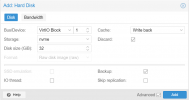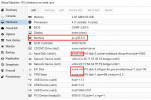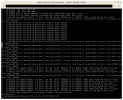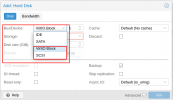ProblemType: Bug
ApportVersion: 2.20.11-0ubuntu27.18
Architecture: amd64
CasperMD5CheckResult: pass
CasperVersion: 1.445.1
CrashDB: {'impl': 'launchpad', 'project': 'subiquity'}
...
[ 90.027587] Buffer I/O error on device vda2, logical block 6328700
[ 90.027588] Buffer I/O error on device vda2, logical block 6328701
[ 90.027588] Buffer I/O error on device vda2, logical block 6328702
[ 90.027589] Buffer I/O error on device vda2, logical block 6328703
[ 90.027589] Buffer I/O error on device vda2, logical block 6328704
[ 90.027590] Buffer I/O error on device vda2, logical block 6328705
[ 90.027590] Buffer I/O error on device vda2, logical block 6328706
[ 90.027591] Buffer I/O error on device vda2, logical block 6328707
[ 90.027591] Buffer I/O error on device vda2, logical block 6328708
[ 90.027592] Buffer I/O error on device vda2, logical block 6328709
...
[ 100.051446] buffer_io_error: 3281 callbacks suppressed
[ 100.051447] Buffer I/O error on device vda2, logical block 71680
[ 100.051450] Buffer I/O error on device vda2, logical block 71681
[ 100.051450] Buffer I/O error on device vda2, logical block 71682
[ 100.051451] Buffer I/O error on device vda2, logical block 71683
[ 100.051451] Buffer I/O error on device vda2, logical block 71684
[ 100.051452] Buffer I/O error on device vda2, logical block 71685
[ 100.051452] Buffer I/O error on device vda2, logical block 71686
[ 100.051453] Buffer I/O error on device vda2, logical block 71687
[ 100.051453] Buffer I/O error on device vda2, logical block 71688
[ 100.051454] Buffer I/O error on device vda2, logical block 71689
...
[ 112.542475] buffer_io_error: 3574 callbacks suppressed
[ 112.542476] Buffer I/O error on device vda2, logical block 95746
[ 112.542478] Buffer I/O error on device vda2, logical block 95747
[ 112.542479] Buffer I/O error on device vda2, logical block 95748
[ 112.542480] Buffer I/O error on device vda2, logical block 95749
[ 112.542480] Buffer I/O error on device vda2, logical block 95750
[ 112.542481] Buffer I/O error on device vda2, logical block 95751
[ 112.542481] Buffer I/O error on device vda2, logical block 95752
[ 112.542482] Buffer I/O error on device vda2, logical block 95753
[ 112.542483] Buffer I/O error on device vda2, logical block 95754
[ 112.542490] Buffer I/O error on device vda2, logical block 95755
...
[ 124.734771] JBD2: Detected IO errors while flushing file data on vda2-8
CurtinConfig:
# Autogenerated by Subiquity: 2021-11-16 02:22:39.372259 UTC
apt:
preserve_sources_list: false
primary:
- arches: [amd64, i386]
uri: http://th.archive.ubuntu.com/ubuntu
- arches: [default]
uri: http://ports.ubuntu.com/ubuntu-ports
curthooks_commands:
001-configure-apt: [/snap/subiquity/2651/bin/subiquity-configure-apt, /snap/subiquity/2651/usr/bin/python3,
'true']
debconf_selections: {subiquity: ''}
grub: {probe_additional_os: true, terminal: unmodified}
install: {save_install_config: /var/log/installer/curtin-install-cfg.yaml, save_install_log: /var/log/installer/curtin-install.log,
target: /target, unmount: disabled}
kernel: {package: linux-generic}
pollinate:
user_agent: {subiquity: 21.08.2_2651}
reporting:
subiquity: {identifier: curtin_event.1862, type: journald}
sources: {ubuntu00: 'cp:///media/filesystem'}
stages: [early, partitioning, extract, curthooks, hook, late]
storage:
config:
- {ptable: gpt, path: /dev/vda, wipe: superblock-recursive, preserve: false, name: '',
grub_device: true, type: disk, id: disk-vda}
- {device: disk-vda, size: 1048576, flag: bios_grub, number: 1, preserve: false,
grub_device: false, type: partition, id: partition-0}
- {device: disk-vda, size: 34356592640, wipe: superblock, flag: '', number: 2, preserve: false,
grub_device: false, type: partition, id: partition-1}
- {fstype: ext4, volume: partition-1, preserve: false, type: format, id: format-0}
- {path: /, device: format-0, type: mount, id: mount-0}
version: 1
verbosity: 3
write_files:
etc_default_keyboard: {content: '# KEYBOARD CONFIGURATION FILE
# Consult the keyboard(5) manual page.
XKBMODEL="pc105"
XKBLAYOUT="us"
XKBVARIANT=""
XKBOPTIONS=""
BACKSPACE="guess"
', path: etc/default/keyboard, permissions: 420}
etc_machine_id: {content: '81353fe4a9d14f0b8c12ba202ea7daff
', path: etc/machine-id, permissions: 292}
etc_netplan_installer: {content: "# This is the network config written by 'subiquity'\n\
network:\n ethernets:\n ens18:\n dhcp4: true\n version: 2\n", path: etc/netplan/00-installer-config.yaml}
md5check: {content: "{\n \"checksum_missmatch\": [\n],\n \"result\": \"pass\"\n\
}\n", path: var/log/installer/casper-md5check.json, permissions: 420}
media_info: {content: Ubuntu-Server 20.04.3 LTS "Focal Fossa" - Release amd64 (20210824),
path: var/log/installer/media-info, permissions: 420}
nonet: {content: 'network: {config: disabled}
', path: etc/cloud/cloud.cfg.d/subiquity-disable-cloudinit-networking.cfg}
CurtinErrors:
curtin-logs-2021-11-16-02-23/





